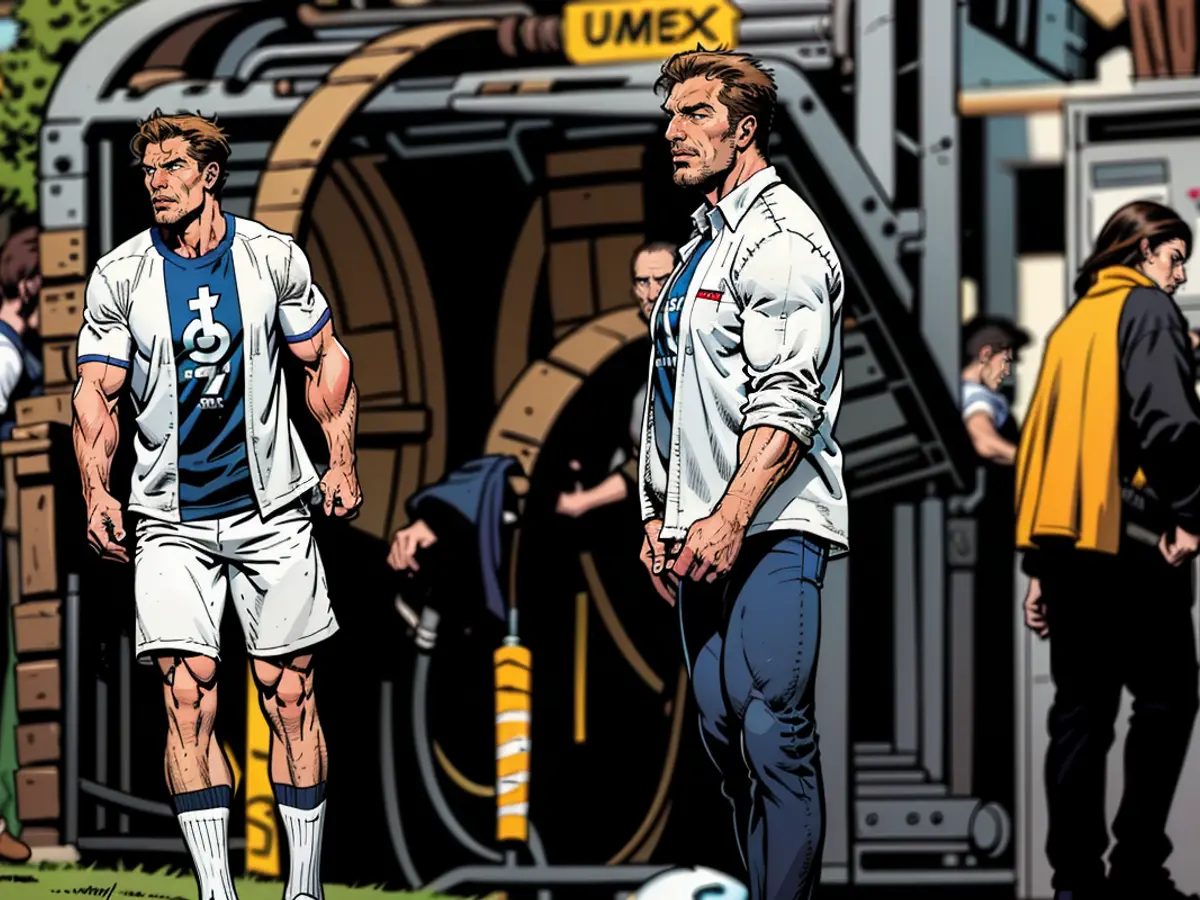Nagelsmann knows what the DFB team doesn't need
One year ago, it seemed impossible, now it's reality: The German football national team is in the knockout stage of the Home-European Championship. Many factors have contributed to this, especially Bundestrainer Julian Nagelsmann.
For a long time, we hadn't seen that before: A Bundestrainer, completely detached from the sideline into the air. The late 1:1 against Switzerland on Sunday evening didn't just wake up the stadium in Frankfurt am Main, but it seems, also Julian Nagelsmann. The television images show him storming along the sideline after Niclas Füllkrug's goal at his own substitution bench. Shortly thereafter, he gave an interview to the ARD, his voice was still hoarse.
Six days have passed since these unusual images. In the evening, the German football national team plays against Denmark in Dortmund the Round of 16 of the Home-European Championship (21.00 hours/ZDF, MagentaTV and of course in the ntv.de-Live ticker). The DFB team could make it to the first quarter-final since eight years, since the EM 2016 half-final. From now on, a new mode begins - every second can be decisive. But above all, it's a special game for one: Bundestrainer Julian Nagelsmann.
For the 36-year-old, it's the twelfth international match since the previous fall. Since taking office in the previous fall, he has made a remarkable transformation. The job of the Bundestrainer is different than that of a club trainer. Nagelsmann had to learn that. Not only is the work with the players different, but also the attention. Whether it's just sartorially: At his debut in the USA, he caused a stir with a lumberjack shirt, as he often did at FC Bayern. Today, he's far removed from that, he wears rather dark blue and inconspicuous.
No more experiments
One thing is not surprising at all: the sporting aspect. The DFB team had not made things easy for those who believed in it in recent years. Twice it failed in the World Cup group stages, the national team year 2023 ended with more losses than wins. The games were rarely appealing, the DFB team was never consistent. Nagelsmann began his tenure as Bundestrainer shakily, but then dared a restart at the turn of the year.
It was the last attempt to save the Home-EM. And it succeeded: Nagelsmann gave the unsettled DFB team a calculable environment. He now acts accordingly: Experiments and surprises are the last thing this team needs. The role system he introduced reflects that. Along with the return of midfield strategist Toni Kroos, he thus also laid off the burdens of his predecessors Hansi Flick and Joachim Löw.
A clear hierarchy and, even more importantly, the performance principle returned: The DFB players have guidelines they can orient themselves by. The formations change less, sometimes the substitutions are even clear before the kick-off. When the young Aleksandar Pavlović fell ill before the start of the tournament and had to withdraw, he nominated Emre Can instead. It was the most pragmatic solution, choosing the two-footed player who had recently stood on the field in the Champions League final.
It turns out that Nagelsmann is the one responsible for pragmatism, which holds a certain irony. For he was once a different type of coach. Someone who sometimes overloaded his players with tactical instructions. Someone who installed giant screens at his training grounds at Hoffenheim and FC Bayern to directly show his pros.
During his tenure with the national team, the old Nagelsmann was not completely absent. Initially, it seemed as if the daily work with the players was missing from him. The extension of his contract was always a possibility that he would return to club work immediately after the home European Championship. But after the March-Landers games, he made his confession up to the World Cup 2026.
A lot of imagination
The old version of the coach still comes through at times. Then the new Julian Nagelsmann is asked about it. Before the second EM group game against Hungary, it was about what the coach of the national team really expects from his outside defenders. The game took place in Stuttgart, the new home of Maximilian Mittelstadt, the DFB left-back.
Nagelsmann brought him out, spoke about statistical expectations from his club years (six to seven goals per season). Then he explained how tactical systems of opposing teams have changed. (Caution, it's getting really detailed: Most teams try to pressure their opponents out wide, making the way to the goal as long as possible. The middle is then filled with players, making the outside defenders important.)
At the end, Nagelsmann still addressed another point. The fewest say in the club that "I want to be an outside defender no matter what." It takes imagination, Nagelsmann said, to put a player on that position. And that was it: The very same imagination that marked him as a coach. Finally, in his third DFB appearance against Turkey, he brought on midfielder Kai Havertz to the left-back position. Even though he managed it, it went terribly wrong.
A "wonderful speech"
From these experiments, he has (so far) distanced himself. Recently, most of his moves were safe. Only the changes in the Switzerland game raised questions: Why did Füllkrug come on so late? Why was there suddenly the double six of Ilkay Gündogan and Kroos on the field? Why was Maximilian Beier even brought on? The game showed: The new strength, the predictability, can be a risk: Switzerland was well prepared for the DFB team. At some point, surprises are needed, then the question arises: How many experiments can this DFB team handle? In the first group games, it was still too fragile for that.
Otherwise, Nagelsmann gives the impression that he knows what expectations lie on this (new) DFB team. A home European Championship! Something like that only comes in a player generation at most once with luck. And even though they are the oldest team in the tournament, many of them have not yet played a knockout game. In addition, there is the pressure that comes from outside: It has to be the great summer fairy tale, a noisy football festival, the best-case scenario of which unites the continent. In the accounting, however, it needs a DFB team that climbs the tournament tree as far as possible.
Somehow Nagelsmann managed to handle it during the week. DFB sports director Rudi Völler sat in the large press hall at the EURO quarters before the journalists and journalistesses. He spoke about how the national coach achieved this. Völler quoted from a "wonderful speech" that Nagelsmann gave before the tournament began. The national coach conveyed that it was a privilege to feel this pressure. So far, it has worked. At the stadium, hardly any feeling arose that the team was nervous in any way.
However, the national coach was different in this regard. And even here, he changed. The evening before the first group game against Scotland, Nagelsmann held his first press conference at a major tournament. The nerves were tingling in the Munich stadium, the keyboards were clicking, the journalistesses and journalists were whispering. Nagelsmann felt it: the nervousness in himself and all around him. He spoke of it and admonished everyone sitting in this room to please be a little quieter. It was as if he were also having a conversation with himself. And look at that: Afterwards, everything ran more smoothly. The question and answer session became more relaxed, his words seemed less forced.
Now, just two weeks later, it is already much more routine. After all, one knows roughly what to expect from the German team. Nagelsmann answers the questions more securely, is less nervous - and says so himself. "I'm still very relaxed because the coaching team and the team have worked well," he said the evening before the round of 16 on the question of nervousness. "We are extremely well prepared for everything." Once again, it's rustling in the background, the press room is at least as full as in Munich. But he didn't say anything about that.
In the upcoming Round of 16 match against Denmark, the German football national team has the opportunity to reach the first quarter-final since 2016. This is a significant challenge for Julian Nagelsmann, who has been the Bundestrainer for over a year now and has made a notable transformation in his role.
Since his appointment, Nagelsmann has moved away from experiments and surprises, opting for a more calculated approach with the team. This shift in strategy has been key in helping the team progress to the knockout stage of the European Football Championship 2024. Despite his previous reputation as a coach who would overload his players with tactical instructions, Nagelsmann has shown a new level of pragmatism in his role as the Bundestrainer.









